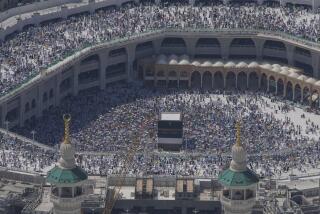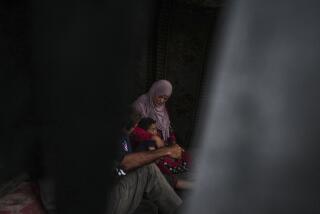Quiet pyramids, empty hotels: Egypt unrest takes a toll on tourism
SHARM EL SHEIK, Egypt -- The deadly protests and political turbulence that have swept Egypt in recent months are keeping Western tourists away from the resorts, beaches and famous scuba diving waters across the southern Sinai Peninsula.
“This summer is by far the worst I have seen,” said Mohamed Ismail Abdullah, who has worked as a tour guide here for 14 years. “Hotel occupancy at this time of the year usually ranges between 70% to 80%. Now we have no more than 50%, and that’s only because of the Eid holidays [this month] that brought many Egyptians and tourists from the Arab Gulf countries.”
“Hotels were literally empty for at least one good month before Eid,” he added.
At least one in eight Egyptians rely on tourism for their livelihoods. But the industry, which had provided up to 20% of Egypt’s foreign-currency income, has been sliding since the 2011 uprising that toppled longtime president Hosni Mubarak. The bazaars and pyramids around Cairo are quiet, and tourist boats from Luxor to Aswan are empty and docked along the Nile.
While governorates across the country have suffered from constant political unrest, southern Sinai had remained a haven for many tourists traveling from Europe. But a rise in militant attacks on the peninsula and the military’s violent nationwide crackdown on the Muslim Brotherhood organization -- which killed at least 900 people in the last two weeks -- have drawn travel warnings that have sharply reduced tourism.
Statistics in Egypt are often unreliable. The state agency for statistics reported that the number of tourists has edged up since 2012, but that the length of their stays has so far dropped by 16% this year. The numbers do not reflect the effect of the most recent unrest on the tourism industry.
The spread of violence meant that Sharm El Sheik had to abide -- even if just for one day last week -- by an 11-hour curfew.
“Many tourists decided to cut short their holidays and leave. They had no clear image of what was going on in Cairo and other places, but the idea of living under a curfew scared them,” said Tamer Ibrahim, a general manager at a five-star hotel.
“Many European governments are barring their nationals from coming to Egypt. Since June 30, Germans have been advised not to come. They have completely stopped coming to our hotels. The same goes for the Swiss and Scandinavians.”
Ibrahim’s fear is that the coup last month that overthrew Islamist president Mohamed Morsi -- the country’s first freely elected leader -- may drive away tourists from some Western countries for good.
Brian Bennett, a British welder from Liverpool, said he came to Egypt despite security warnings.
“Many people back home thought I was crazy to bring my family here at such a critical timing, but because I’ve been here two times already since the revolution, I know that Sharm is totally remote from the violence in other spots,” he said.
ALSO:
U.N. warns U.S. against illegal spying on diplomats
Swiss open voter-approved drive-in ‘sex boxes’ to protect prostitutes
Pressure mounts for strikes on Syria over apparent use of poison gas
Hassan is a special correspondent.
More to Read
Sign up for Essential California
The most important California stories and recommendations in your inbox every morning.
You may occasionally receive promotional content from the Los Angeles Times.










